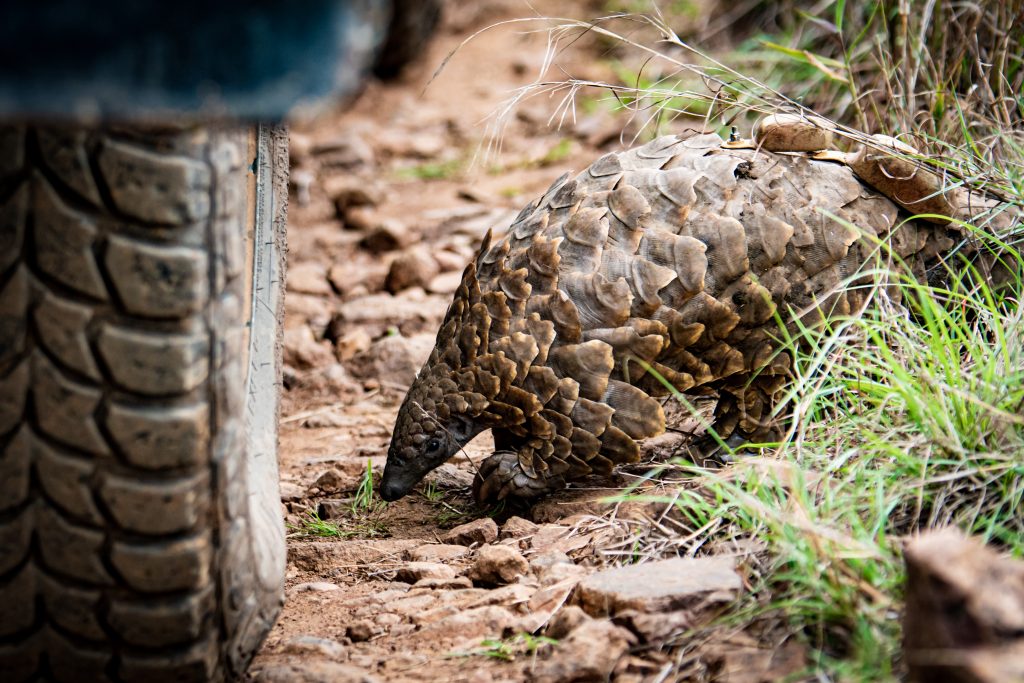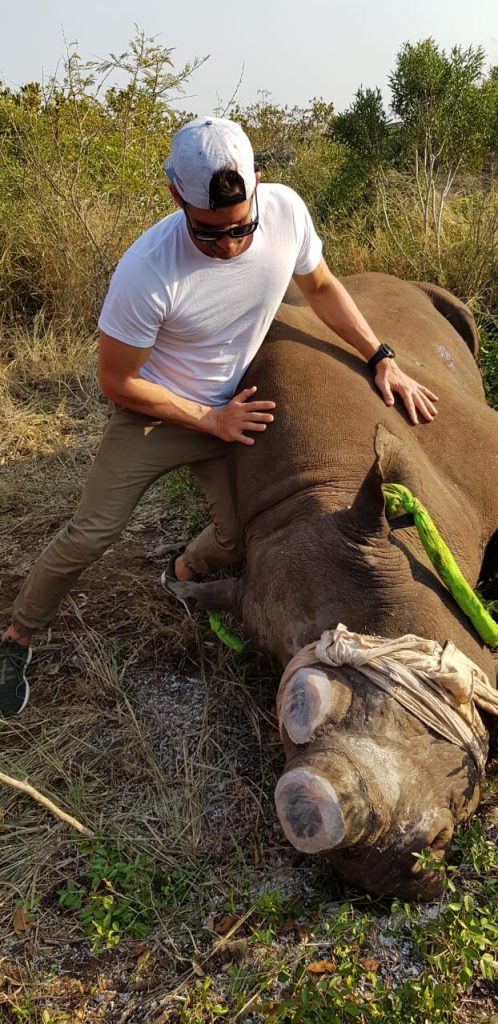
This endangered pangolin deserves protection in more ways than one. It’s part of a reintroduction project, closely monitored by researchers via the tracking device on its back, and located on a reserve in sub-Saharan Africa. Image: Simon Smith Photography. There is another picture further on in this article that depicts a dehorned rhino which some readers may find unsettling.
With the 2022 World Wildlife Day call for the application of innovative measures for the protection of wildlife, we take a look at the growing and gratifying role that Whistle Blowers (Pty) Ltd is playing in national parks and game reserves on the African continent with their ethics hotline.
It’s a challenge faced by every business. With growth comes risk, increasing as human and physical resources expand.
Imagine for a moment that you are a custodian of enormous quantities of diverse, high value, fast moving assets – located across millions of hectares.
This is the reality faced by those responsible for the management of national parks and game reserves.
While other organisations employ a range of methods to secure what they procure and produce, there is no ease of stocktaking, surveillance or security when it comes to wild animals requiring protection across vast tracts of land.
Obvious differences aside, there are surprising similarities between national parks and every other sector when it comes to theft: it can occur at the hands of outsiders, or insiders, or insiders and outsiders working together. It often involves corruption, where the scheme architects use methods such as bribery, extortion and fraud to secure the cooperation of those who should otherwise not support their unlawful goals.
In every other sector, information received from key stakeholders – employees, customers and suppliers – plays a pivotal role in fraud detection, and there is no reason why it should be any different for national parks and game reserves. Dale Horne, managing director at South Africa’s Whistle Blowers Ethics Hotline agrees.
He is in a good position to know. At last count, the ethics hotline clients in this sector collectively manage over 20 million hectares of parks and reserves located in Angola, Benin, Botswana, Chad, Central African Republic, Congo, DRC, Kenya, Malawi, Mozambique, Namibia, Rwanda, South Africa, Zambia and Zimbabwe.
‘In many ways the reports that we receive on behalf of our clients who manage parks and reserves are no different from those received from our other public and private sector clients. The difference is that often the whistleblowing report is the only way that the information would ever have become available to the client. And of course, the thieves and fraudsters tend to be called poachers.’ Dale explains.
Whistle Blowers’ ethics hotline client list extends across the private and public sectors, with clients operating in over 40 countries and on six continents, Nevertheless, it is their deep experience in providing a conduit for whistleblowing on the African continent that gives Dale particular satisfaction. With live call answering in multiple languages including Swahili, French, Arabic, Portuguese and all the official South African languages, the Whistle Blowers ethics hotline is well equipped to receive reports relating to wrongdoing affecting parks and reserves in the region.
The experience of attending a rhino dehorning exercise had a profound impact on Dale. ‘It was not only distressing to witness, despite every effort such an intervention is inevitably distressing for the rhino. Even a single report containing useful information that enables the detection and prevention of the maiming or poaching of our endangered species makes offering our hotline service worthwhile’.

Dale Horne, Managing Director at Whistle Blowers Ethics Hotline, explains that having observed first hand the distressing process of dehorning rhinos at a reserve where this was being undertaken to protect the rhinos from poaching, he became more committed than ever before to the delivery of valuable intelligence via the whistleblowing service.
The economic importance of parks and reserves
Parks and reserves play a significant role beyond the conservation of fauna and flora. Examples include the provision of significant employment in rural areas, the economy boosting impact of ecotourism, and the maintenance and rehabilitation of critical ecosystems. In some countries in the region, the effective management of national parks is helping to forge stability in areas that have suffered protracted conflicts.
All these benefits are put at risk, together with the future of so many species, because of illegal activity targeting parks and reserves. Protecting endangered wildlife from criminals is a complex challenge requiring the deployment of a range of tools, of which one is the provision of a safe reporting mechanism for those with valuable intelligence.
The multiple stakeholders blowing the whistle for wildlife
With a growing percentage of the constrained budgets of national parks and reserves going to securing their assets from criminals, providing expertly-managed whistleblowing mechanisms is the most inexpensive weapon in the anti-poaching arsenal.
The vast tracts of land under management are impossible to monitor at all times, a fact that criminals take advantage of. Often, people who work in the parks or live in surrounding areas become privy to information about plans and schemes to target a park’s assets, be these animals or plants.
Those who speak up openly when they hear about criminal plans to target wildlife generally live in circumstances that make them easy targets too. Their ability to blow the whistle anonymously can be the only basis on which they will consider sharing their important information.
What this means is that it is insiders who are in the best position to blow the whistle. Through the awareness programmes delivered by Whistle Blowers, parks employees are coming to trust the independence and guaranteed anonymity their service offers.
‘Imagine the psychological burden of dedicating your time to protecting a park’s natural and physical assets, while knowing that you are withholding valuable intelligence about a planned attack that you have heard about in the community or the canteen. The relief that callers express when they have fulfilled their duty by reporting this information is always evident’.
Dale goes on to explain that not all countries in Africa offer the equivalent of South Africa’s toll-free numbers, meaning that a ranger may make use of the SMS Please Call Me facility to make contact with one of the ethics hotline information agents. Growing smart phone penetration means that reports are now also being received via the hotline’s reporting app.
My concern is whether the location of parks in relation to rural communities suffering high unemployment levels could mean that such measures might increase conflict between the parks and their neighbours? Dale is reassuring as our conversation concludes, ‘Poaching for the pot is a reality that is borne out of poverty. We need socio-economic solutions to the hunger that drives good people to engage in illicit activity. Our interest lies with the criminal syndicates targeting our parks and reserves for corrupt, illegitimate gain. These might be local syndicates who steal large amounts of game for slaughter and distribution through legitimate-looking butcheries, or they may be trans-national criminal operations’.
Either way, it is good to know that low-cost, high-value services such as the expert receipt of information can play a role in the detection and deterrence of unethical activity targeting our parks and reserves.
Useful references
You can learn more about World Wildlife Day on the official site at https://wildlifeday.org/
Find out more about the Whistle Blowers ethics hotline service on their website at www.whistleblowing.co.za or email admin@whistleblowing.co.za for more information.
Written by


Leave a Reply